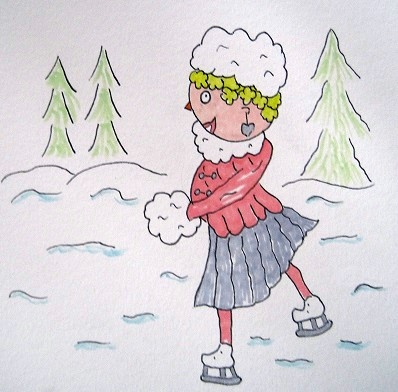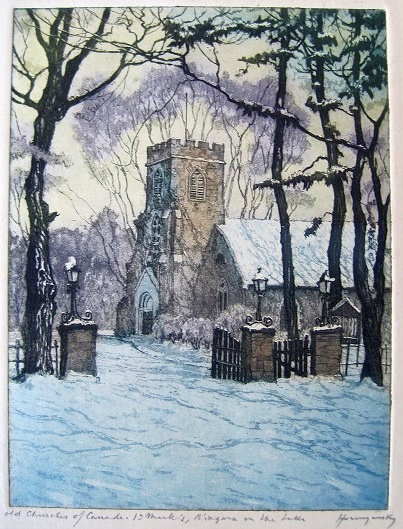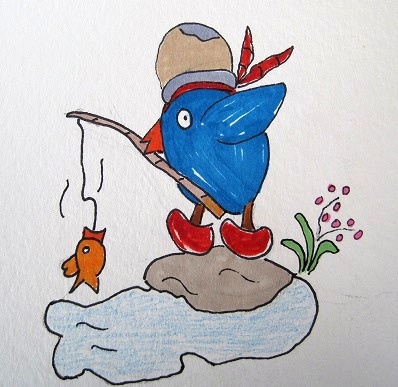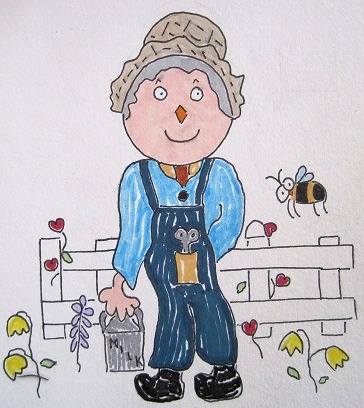
It’s the last month yes December is here
And in a few days we will celebrate a new year
This month will go by like all the rest
Yes all the ones before that were the best
Snowmobiles will be out this winter once again
May no accidents happen and no one suffer pain
The wild geese are gone and will be back in May
And boats and summer things are now put away
Those who got a deer may they enjoy the meat
I hope they give thanks as they sit down to eat
A team was harnessed and hooked up to the sleigh
So folks got on for a ride on the winters day
All the trees were bare with snow all around
While the house was cozy as the moon shone down
Ride program is in effect to catch impaired drivers
I say change it to side and we’ll have more survivors
Christmas is coming and children are full of joy
Hoping they will get some more new toys
There were many presents there under the tree
But if times get hard not one there will be
Children will skate and play in the snow
As we done the same back many years ago
There isn’t much sun in December it will be back soon
Yes there will be more of it before we hit June
Others will ice fish if there is enough on the lake
And as they go home may the limit is all they take
Since its cooler out we’ll all spend more time indoors
So isn’t it a good time to do those put off chores
Christmas is the time we have a big celebration
But isn’t it Christ’s birthday were to celebrate in our nation
Winston E. Ralph
Bancroft, Ont.

[PHOTO: Jesse Morningstar Timber Mill circa 1940]
In Hamblyns field where the brush does grow
There used to be lumber piles yes row upon row
The trees were cut in the bush up on the hill
Then cut into logs and hauled down to the mill
Horses brought the sleighs along an icy road
Where hills were sanded to stop a runaway load
In the bush there wasn’t any chainsaw sound
Only axes chopping and trees as they hit the ground
The camp the men stayed in was full of lice
And smells of wet dirty clothes wouldn’t be nice
Yes at 4 a.m. they arose from their bed
They had breakfast of salt pork beans tea and bread
They started in the bush long before daylight
And finished in the dark later that night
There at the mill they worked hard all day
Only back then they got very little pay
The mill saw was kept sharp to get through the wood
As two men cutting boards wouldn’t if they could
Some logs they cut were maple beech birch and oak
But working in the mill or the bush it was no joke
The lumber was piled up high yes all by hand
And it sure would have been not in that field of sand
Some of the lumber was taken and put in a boxcar
To be taken by train to places near and far
Those folks maybe felt times will be better somehow
Yes times are better nowadays and they’re all gone now
Back then to the mill did a short cut someone take
As there is a team and a sleigh load of logs in Mullet Lake
Good stories today that area could tell if it could talk
But those stories to people today would really shock
Bessemer village the mill and the train are gone too
Logs are hauled away by trucks ruining the roads they do
There is very little there now like in days of yore
Only a cottage or two but no big village as there was before
Winston E. Ralph
Bancroft, Ontario

The old school house sat at the top of the hill
Where each day with knowledge our heads were filled
If you couldn’t learn the teacher wondered why
So you got the strap even if it made you cry
You had to do your homework not talk or shout
Then bravely you faced the world when you went out
Your schooling only went to grade seven or eight
So any job you were offered it you did take
Yes the teachers then didn’t fool around
And in the graduating class not a criminal was found
The old general store was over a little ways
Where the proprietor always spent many long days
He was open from early morning until late at night
When men sat and talked about things not right
There was candy for the children and a cooler with pop
And for things you needed it was there you did shop
He had brooms wash tubs and saws for sale
In the winter the stove was lit and never did fail
Ladies could buy cloth and there were dishes too
Also kerosene boots and clothing for me and you
The garage was close by where you bought your gas
And the owner always waved when you went past
He also changed the tires and greased your car
Since he knew it would be needed if you went very far
Tune ups were done also to keep the car running right
So you wouldn’t be stranded during the day or night
Back then the tires would often go flat
But without a tube now there is a lot less of that
The church was over further where on Sunday morn
You were told to be in Heaven you had to be reborn
He wasn’t shy about the word as he was commanded to do
And said turn to Him now or in Heaven there’ll be only a few
The cemetery was nearby where the older folks lay
Yes they all lived closer to Him back in their day
But most aren’t concerned as Sunday comes around
Doesn’t the Bible say in church we’re to be found
Winston E. Ralph
Bancroft, Ont.
[Compiled by ‘S’]
A log school house on the farm of Mr. Henderson one mile west of the church and Black’s west of Boyle school was used for church services until 1866. The Quarterly Conference of the Episcpal Methodist church met when it was determined to build a church at Robin’s Bridge across the river Welland in the township of Wainfleet.
The trustees appointed were Walter Henderson, Cyrus Robins, Albert Putman, Eli Robins and George Eastman.
It was a community project with neighbours providing labour and skills. For example Pelick Tabour Farr Jr. Used oxen to haul timber when the Salem Methodist church was built.
Walter Henderson was one of the founders of Salem Methodist church and is said to have given the church its name.
The church dedication took place March 8, 1868. Mr. Richard Farr was ordained deacon.
The minister’s salary was $400.
The first baby christened was Alba Robins (Mrs. Cyrus Brown)
When the organ was installed in 1885, she became the first organist.
The deed to the tract of land was deed to the church December 17, 1870 by Peter Jones and Phoebe Jones.
First stewards were Leonard Haney, David Brown, Cyrus Robins and Gavin Robertson.
In 1885 the first Ladies Aid was organized. Mrs. Walter Henderson as President.
In 1968 the Salem Church was sold to The Church of Christ.
MINISTERS OF SALEM UNITED CHURCH
Early preachers were Richard Dawdy, Walter Henderson. Revs Phillips, Servie, Pomeroy, and Duff.
1871-72 Rev. A Beamer, Rev, J.R. Phillips
1874-75 Rev. John Reynolds
1876 Rev. B.L. Cohoe
1878-80 Rev. J. Fairchilds
1881 Rev. E.L. Clement
1883 Rev. E Adams
1884 Rev. H.A. Cook
1886 Rev. Mr. Collings
1887 Rev. O.G. Collimore
1894 Rev. E.H. Taylor
1896 Rev. George E. Honey
1899 Rev. Thomas Grandy
1902 Rev, Thomas Amey
1906 Rev. D,A. Walker
1909 Rev. W.A. Terry
1910 Rev. Jas. Webb
1912 Rev. W.L. Davidson
1915 Rev, G.B. Snyder
1917 Rev. Mr. Knight
1919 Rev. Chas. Jay
1923 Rev. P.A. MacMillan
1925 Rev. Gordon Domm
1925-1931 Rev. W.C. Almack
1931-1939 Rev. George C. Cropp
1935-1945 Rev James Hampson
1945 Rev. W.A. Dempsey
1968 Rev B.W. Ball
References
A History of Salem Congregation, the United church of Canada. 1868-1948.
Chronicles of Wainfleet Township. Wainfleet Historical Society. 1992.

There are green fields in Virginia here its green hills
Which give the city folk a really big thrill
People can walk in the bush looking at the trees
But be careful don’t trip and scrape your knees
The roads are winding with many different scenes
Yes its better here than any place we’ve been
All around Bancroft is an area that has it all
From a cool spring to colored leaves in the fall
The springtime is nice with the melting of the snow
So heavy clothes aren’t needed wherever you go
As the snow melts we see crocus start to bloom
And the nice weather brings other flowers soon
On some spring days the weather is very hot
But on other ones most say it sure is not
When the weather warms up more cars there are
Even though most of them never go very far
The farmers in the spring are out planting crops
They keep going until done then they can stop
Houses are kept better now than years ago
As money was scarce then this we all know
The northern part of our county is rugged as can be
While the southern is more level that we all see
There is logging and other jobs but a lot of poverty
Since this is my hometown its the only place for me
The folks are friendly and some prices may be high
So when at the store what I need is all that I buy
We may look outside and say it looks like a nice day
But by noon the weather has went the other way
There is a haze looking like a fog but its no joke
It comes from a distant forest fires great big smoke
The winters may be cold but not like years ago
As I recall seeing -40c for two weeks or so.
Winston E. Ralph
Bancroft, Ont.
[Written by Sharon Misener June 26, 2024]
In the 1960s many small farms dotted the lands of Ontario. “Ma and Pa operations” with 100-200 acres of land with 20-40 Holstein cows, sending milk to the local dairy.
As time went on the farmers retired and the farms were turned into hobby farms or swallowed up by the big farms of today.
I grew upon on a dairy farm in Fenwick, Ontario, was an only child. My maternal grandparents lived two miles down the road in Boyle.
A typical day on the farm, my dad was up at 7 a.m, went to the barn to milk the cows. He came into the house at 9a.m. to have breakfast. His favorite cereal was puffed wheat with a good strong perked coffee from A&P.
We had Holstein cows about 40 along with pigs, chickens and sheep. We sent milk to Sunnyside Dairy in Welland. Had a big bulk tank to keep the milk cool, a truck picked up the milk daily. My mother washed the milking machines, the milkhouse had to be clean.
After school I came home, and read the Hamilton Spectator Newspaper then made my way to the barn to feed the cows. They ate chop, silage and hay. I also fed the pigs and calves.
We came into the house and had supper that my mother had prepared. Usually meat, potatoes, vegetables and cake or cookies for dessert. After supper my dad went to the barn to milk the cows. He usually got back to the house about 9 p.m. Myself I played the piano and did homework, afterwhich I watched a bit of TV. 10P.M. was the usual bedtime.
My mother grew a big garden, had potatoes, usually enough to last the winter. Also planted tomatoes, onions, radish, cucumber, pumpkin, cabbage lettuce and peppers to name a few.
We also grew raspberries apples, pears, quince and she always canned 5 bushels of peaches each year. In the yard we had lilacs, rhubarb, and willow trees. My mother planted pink petunias, her favorite, also window boxes of colorful flowers.
We had a hammock in the yard, tables and chairs with flowers all around. Many older evergreen trees grew as well.
In many ways we were self-sufficient.We butchered a cow to have frozen and canned meat. My mother also froze and canned vegetables and fruits. Many weekends I would bake cookies and freeze them.
I went to a one-room school at Boyle, we had grades 1-6, with one teacher. For grades 7-8 I went to Wellandport and for high school Pelham High in Fenwick.
At Boyle we had one teacher who seemed to control the classroom.We had special events at Christmas. I played the piano. We had a concert and a play where the community could attend. Valentines Day we had special treats gave each other valentines. One year we brought our skates and skated on the neighbor’s pond.. There was a field day in Wellandport. We boarded a bus and participated in the field day events.
We had a little library, I remember reading all of the Nancy Drew books. We played marbles, skip rope, Simon says, and baseball.
During the summer I worked on the farm, drove the tractor for haying, baled hay and stooked it. I also sewed my mother shift dresses for summer and made clothes for myself.. I also mowed the grass all summer which took 3 hours to mow.
I had a dog names Petunia, she would fetch the cows from the field. I remember a time when the cows crossed the bridge over the Welland River and a cow decided to swim across the river, I held my breath.
I had a swing near the Boyle Road and watched the traffic on Hwy 57.I spent many hours contemplating life on the swing.
On a Sunday afternoon my dad might take a drive around the countryside. When I was 16 I got my drivers license.. The bridge was out between out farms so I had to drive bales of hay around the farms..
One year m dad gave me a calf—a Hereford, I called her Morticia. Then one day my dad sold her.I was so sad.
At the end of the summer my dad ask what I wanted, I said I wanted a typewriter. I had the typewriter for years and wrote many stories. One year my dad made me a bookcase, which I still have today.
Christmas on the farm was a special time. My dad would go to the bush and cut down a tree and my mother would put it in the livingroom and decorate it with lights and tinsel. I would help her decorate too. My parents never traded Christmas gifts. Myself I received three gifts, stiffed animals, clothes and dolls.
We would have my maternal grandparents for Christmas dinner. My mother made dark Christmas cake. She cooked and stuffed a turkey along with potatoes, vegetables and salad. Dessert was jello and whipped cream.
I wrote letters to Santa in Buffalo, NY, still have his photo. My mother sent many cards and received many in return.

June has come the best month of the year
So may the nice weather fill us with cheer
We don’t need a winter coat or heavy boots
And children can be outside without a snowsuit
Its nice to be outside even for a few hours
Enjoying the nice weather while tending the flowers
Wood is cut split and piled up to dry
By the sun away up there in the sky
Some have a garden and its planted we know
So now we just wait for rain to make it grow
In the garden there are vegetables galore
Carrot peas potatoes and much much more
Just watch the sun doesn’t burn your skin
And from 10 am-2pm it’s best to stay in
As the flowers bloom to our face comes a smile
Since we know they’ll be there for a little while
We can take a drive down the road in the car
But with expensive gas we won’t be able to go far
And we can visit an old village to learn of yester year
But how would people be if those times return here
In families with the schools and the old general store
The old schools are gone but the stores are around a little more
Through the bush we can go on a little hike
Or maybe fishing or swimming or ride a bike
The grass is cut often as it grows real quick
As its hard to cut if we let it get too thick
We can visit others even if the weather turns bad
Then return home safely and happy not feeling sad
So enjoy the good weather it won’t be here long
Winter is getting closer and summer will be gone
Winston E. Ralph
Bancroft, Ont.

The bait and tackle shop sat by the lake
Where folks came to see how many fish they’d take
Some of the fish were Pickerel Bass and Trout
So may everyone only take their limit out
Before the shop is open some people came
Even though it was cloudy and looked like rain
There were canoes wooden and aluminum boats
Will anyone because of their haul try to boast
Early in the morning is the best time to fish
But they were better when cooked in a dish
You went to fish in a car or a pickup truck
But some fished all day without any luck.
Children walked there to take a dip in the lake
As on a hot day a swim sure felt great
The fishing tackle didn’t cost much unlike today
And as bait was live little you also did pay
At night a bonfire was there on the shore
Before the folks left to return later once more
No licence was needed to enjoy the pastime
But today you need one so you won’t get a fine
Some used a stick with a line and a hook
To see if they’d get a fish for supper to cook
Years ago people walked miles to fish through the ice
Then returned at night with a catch so nice
It’s hardly worth the bother to go and fish today
As all fish have mercury and other chemicals I say
I’ve never fished much as I’d rather go for a swim
Instead of hoping for a fish the water was good to be in.
Winston Ralph – Bancroft, ON
The lamp on the table was lit every night
So folks could see to get around in the fading light
The stove was full of wood to keep the house nice
As no one wished for the water pail to be solid ice
Father sat down with a paper in his big chair
To read the news and happenings around there
And mother sat in her rocker and knitted away
It was the only time she could sit every day
The children done homework there at the table
And they done it all even if they weren’t able
All chores the children had were done before dark
Getting wood water and for kindling a little bark
The dog slept by the stove as all day it was outside
And felt like getting warm there by the stove fireside
Outside the cat wandered and looked around
To see if a mouse or squirrel could be found
The cattle were fed and bedded in the barn
Where they knew there wouldn’t be any harm
All the harvest was put away it was well into the fall
So they had lots of food if someone did call
There were pickles, berries and jams galore
And others would say you have more here than a store
The store was four miles away and there was no car
Food was prepared for winter as the store was too far
Next morning father said goodbye as he left to cut wood
Cutting wood kept us fit others should do it if they could

There he sat on a tree while he ate his lunch
And remarked that morning he had cut a big bunch
Coming home at night he stamped his feet at the door
The said “Lord willing” tomorrow I’ll cut a little more.
Winston E. Ralph
Bancroft, Ont.
[Vilma (Moretti) Ens]
I can hardly remember a time that I didn’t hear the name “Mac”. My sister Dolores being five years ahead of me told me stories every day of her teacher and principal.
R.D. MacArthur, “Mac” of course to everyone she always seemed to be reciting some poem or another. “Mac”, she said had to have a million lines of memory work(maybe 100 lines written, and 250 lines said) that had to be just perfect- as both my sister and “Mac”were perfectionists. By the time I reached grade 8 and had “Mac” for my teacher, I didn’t have to learn any memory work because I know more than enough from Dolores continual recitation.
I had also heard of the discipline that was meted out. Mr. MacArthur and I had it pounded into my head that I had to be good or I would be sent to the office to “Mac” and then I would really be in trouble. Imagine my surprise when I had him as my teacher in grade 8 and found him to be wonderful. He helped me so much during the most tramatic year of my young life when my father was sick and after his death “Mac” gave me so much encouragement, guidance and help and those positive words that told me I would be O.K. and I would make it.
My father had instilled in me the love of sports and Mr. MacArthur gave it the credibility that it was the right thing to do- even for a girl. Through him baseball became #1 for me. I’ll always remember the world series of 1956-Brooklyn Dodgers vs New York Yankees. The Yankees probably won – we (Mac and I) pulled for the Dodgers. The best part was that he turned the radio on and allowed, us to listen to the game for the afternoon. Of course we had to be quiet and stay in our seats. Even at recess. The only time we could implode was when a team scored.
I never got to thank him for everything because as a kid of 12 i didn’t realize how important all of this was, but I think he must have known the influence he had and how much our lives were made richer by him.

 Subscribe..
Subscribe..





